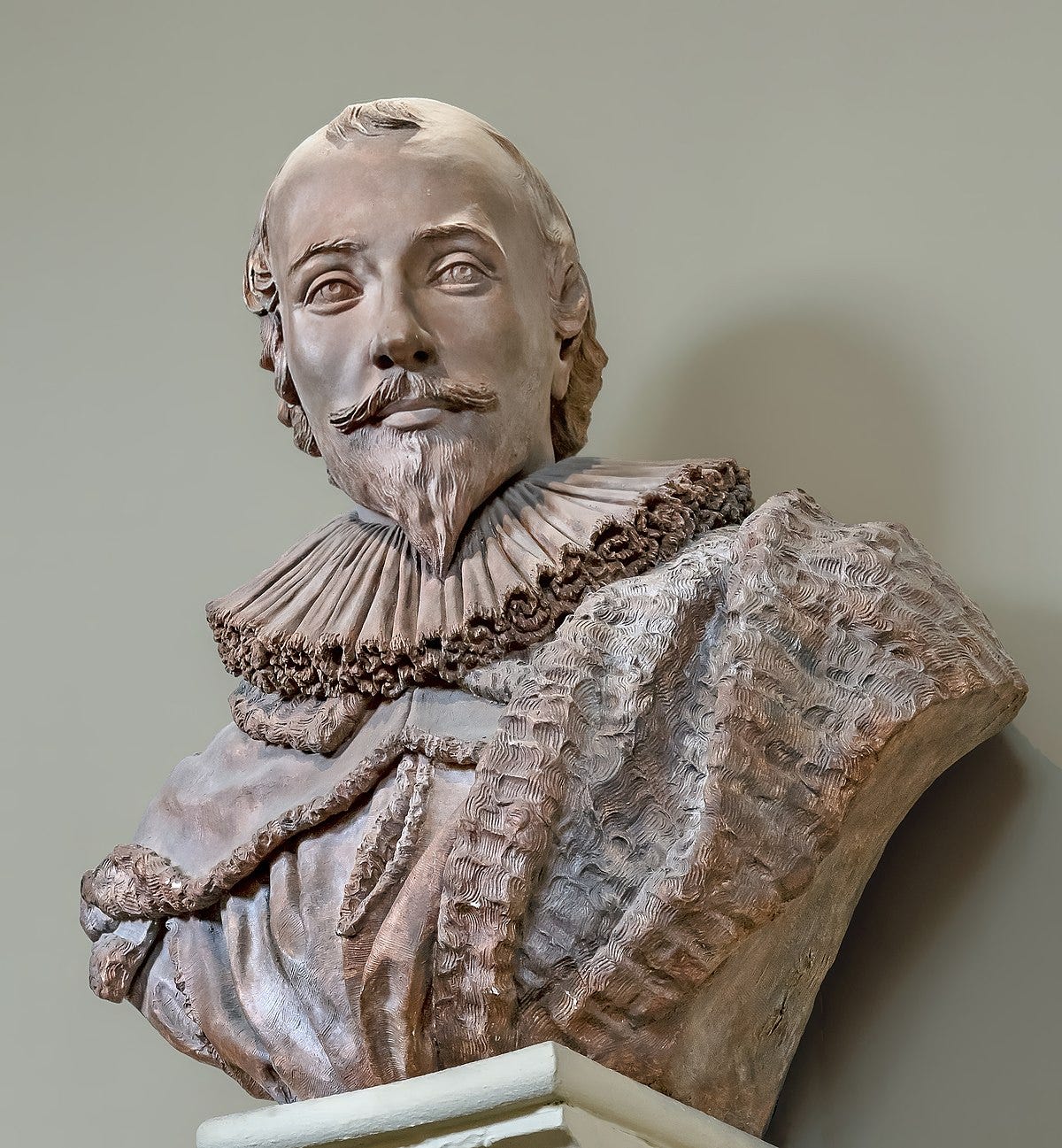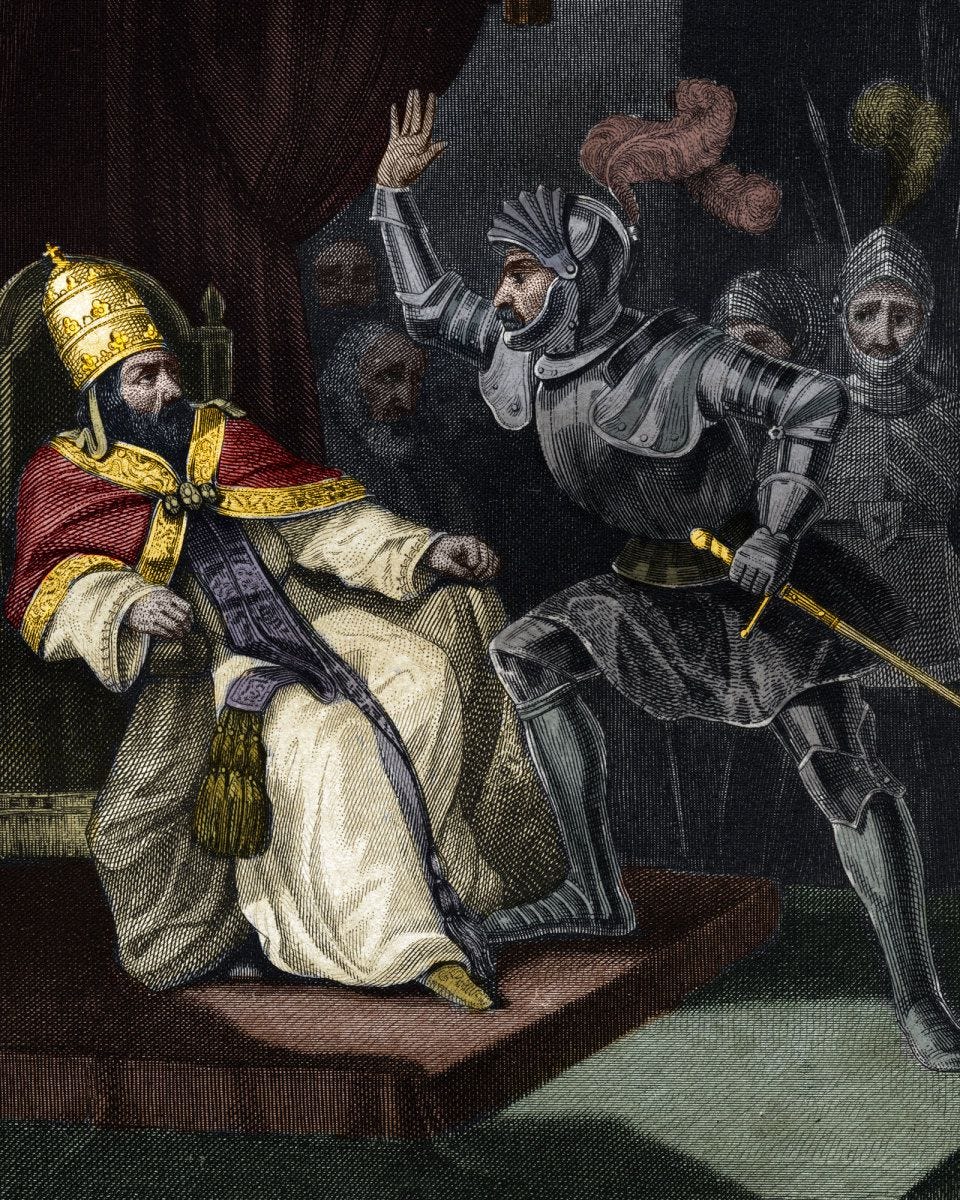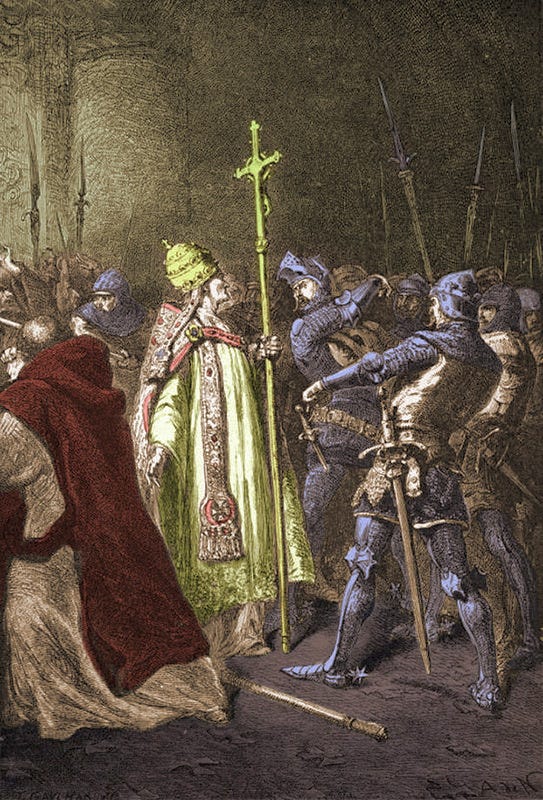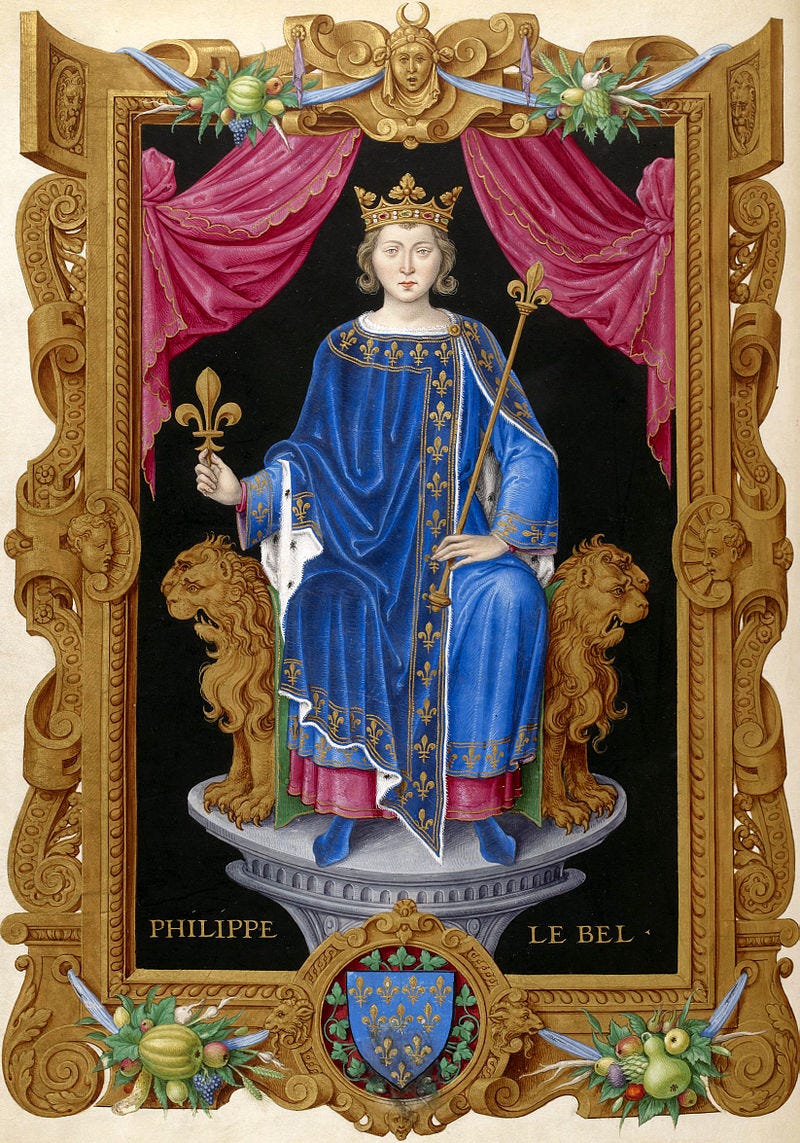It is the most famous slap in history. A slap that made France more than a number of sword strokes or great sentences. A slap or rather a bellows, say the literary people; an iron gauntlet, specify the historians. A gauntlet thrown down to men and to God. A gauntlet, a bellows, a slap, which has perhaps never been given. Never received. A slap, a bellow, a gauntlet, of which it is still unknown whether the putative author was Guillaume de Nogaret or Giacomo Colonna known as Sciarra. A Frenchman or an Italian.
This one, from a great Roman family, is one of those condottieres whose haughty and rough face the Renaissance would soon immortalize. Nogaret is one of those brilliant jurists from the South, the Plaisians, Flote, Marigny, all these "knights of law" who, since the 10th century, have used their knowledge of the Roman "imperium" to break feudal and ecclesiastical rights which limit the sovereignty of the Capetian kings. Michelet calls them the “tyrants of France”, but recognizes that these “demolishers of the Middle Ages” founded “modern civil law”. They are the ones who will build the absolute Monarchy.
The Nogarets come from Languedoc; It is said that Guillaume's grandfather was Cathar. The wicked tongues of the church claim that his determination to break ecclesiastical privileges stems from family vengeance. He was appointed chief judge [juge-mage a.k.a. judex major], a sort of tribunal in his own right, for the seneschal of Beaucaire, near Nîmes. He also negotiated the passage of the city of Montpellier under the sovereignty of the King of France. A few months before this historic slap, he became the main collaborator of Philippe the Fair. Nogaret became de facto chancellor, even if he did not have the official title.
On this Saturday, September 7, 1303, it was sunny and warm in Anagni, an important city populated by thirty thousand souls. Rome then had no more, and its two hundred thousand inhabitants made Paris the most populous city in Europe. Fifty kilometers from Rome, it is the favorite vacation spot of Pope Boniface VIII and his family, the powerful Caetani dynasty. Behind high walls, the city dominates the ancient Via Latina which connects Naples to Rome. Nogaret had been in Italy for many months, but time is running out. His negotiations with the papacy failed. He had learned a few daysprior that Pope Boniface VIII was preparing the “excommunication” of the King of France. The bull, whose publication is scheduled for September 8, could lead to the pure and simple deposition of Philippe the Fair. Historians still wonder if the King of France ordered the pope to be “apprehended” or if he allowed it to happen. Or if he was unaware of Nogaret's activities.
At dawn, an imposing cohort of five hundred horsemen and a thousand infantrymen pressed in front of the city's fortifications. The reiters did not speak French. They came from neighboring Tuscany and Campania. The greatest aristocratic families in the region, the Supinos, the Ceccanos, the Di Mattias, joined forces with the Colonnas; everyone dreamed of taking revenge on the Caetani clan, who exploited the access of one of their own to the Holy See to accumulate prebends and privileges. Nogaret covered them with gold; Sciarra commanded them. They had no trouble entering the city walls. The gold of the King of France was able to convince.
THE SLAP
The enthusiastic crowd shouts: “Long live the King of France, may the Pope die!” Nogaret takes the time to harangue the numerous onlookers, to justify himself, to plead his cause. The soldiers become emboldened. They attack the palace where Benedetto Caetani has retired. Even the cathedral is busy. At 6 p.m., it's all over. Nogaret has the fleur-de-lis banner raised over the pope's house. He faces it with ostentatious dignity. He receives the armed intruders on his bed, dressed in the red pontifical mantle, the tiara on his head, and clutching in his hands the keys of Saint Peter and a crucifix carved from the wood of Golgotha. When he leans forward with false humility, murmuring “Here is the collar, here is the head”, legend claims that Nogaret held Colonna's arm and his iron gauntlet. The famous slap!
Nogaret wastes no time. He commands the pope to convene a general council to respond to the crimes of heresy, simony, blasphemy and usurpation. The other haughtily refuses. Nogaret doesn't care; he won his sprint race; and launched the heresy procedure before the Pope drew his supreme weapon of excommunication. Meanwhile, Sciarra has given rein to his thugs, who are pushing and brutalizing, ransacking and pillaging the august residence without scruple. The crowd of residents mingles with them in frenzied disorder. Benedetto Caetani has a justified reputation for both greed and cowardice; throughout his life he accumulated countless prebends and his taste for profit did not weaken when he became the successor of Saint Peter. Nogaret even accused the Pope's nephews of having robbed their uncle.
Nogaret will not savor his victory for long. On September 9, residents again invaded the Pope's palace, shouting “Long live the Pope! Death to foreigners!” The versatility of crowds is not new. No doubt overcome by a feeling of guilt, they returned most of the proceeds of their plunder, under pressure from their wives and against the promise of “papal indulgence”... Nogaret was wounded in the attack. He fled the city and reached the ramparts of Ferentino, where he would await his revenge under the protection of Rinaldo Da Supino. He remained there until the election of Benedict XI on October 22, 1303.
Boniface VIII has only a few weeks to live. At 70, the shock was too severe. He won't recover. He distributes pardons in abundance, even to Nogaret! He reconciles with everyone, even with the King of France. The imperious Holy Father became a tender pastor. The intractable fighter, a humble penitent. Returning to the Vatican, he died there on the night of October 11 to 12, 1307.
From his retirement, Nogaret does not disarm. His followers spread a sarcastic tercet about their late adversary:
“He entered like a fox
He reigned like a lion
He died like a dog.”
The emotion is immense throughout Christianity. Dante immortalized him in his famous verses from Purgatory: “I see the fleur-de-lis enter Anagni. I see in His vicar Christ made prisoner. I see the gall and vinegar renewed; I see Him being mocked a second time, killed once again between the living thieves.”
The King of France himself seems affected by the scandal. A few days before Christmas, in Toulouse, Philippe the Fair will give Nogaret a frosty welcome. But a few months later, he will shower him with gifts. In the meantime, Nogaret pleaded his case to the king. Was the king playing a double game? Was he looking the part? Philip the Fair, like all the Capetians, is a sincere Christian; his faith, scrupulous and authentic. His private person submits without hesitation to the supreme authority of the pontiff; but the king cannot bow to papal authority. This separation of the spiritual and the temporal, Philippe the Fair practices it instinctively. He cannot give in. This would mean renouncing centuries of slow royal construction. Nogaret's arguments are implacable. Undeniable. The account of the events speaks in his favor.
THE POPE’S MULE
The Pope has gone too far; the King of France too. Both men are as intrepid, as imperious, as proud, as imbued with their prerogatives as each other. Philippe is younger than Boniface; he imposes it physically; he is not nicknamed “the Fair” by chance. The Pope is old, but the liveliness of his spirit is intact. He was one of those brilliant and iconoclastic young minds who did not hesitate to juggle with the Holy Scriptures, going so far as to question the virginity of Mary or the reality of the Trinity. For the sole joy of the joust, for the sole pleasure of arousing fear on the faces of his old masters. He had no idea that one day, a roué jurist named Nogaret would turn his rascal provocations against the hoary pope that he has become, accusing him of all the evils of the earth, heresy, simony, blasphemy, and even sodomy.
Philip the Fair is “emperor in his kingdom.” The pope is sovereign pontiff, pontifex maximus, which formerly designated the emperor of Rome. The tiara he wears on his head recalls his august heritage. Clever minds even wrote a “donation of Constantine”, by which the glorious Emperor Constantine, at the time of his conversion to Christianity, had bequeathed his Western empire to the popes. The text is a fake, but at the time, everyone wanted to believe it.
The pope plays on both frames, the sacred and the temporal. They kiss his mule. The pope is vicar of Christ and no longer just vicar of Peter. At their coronation, they whisper to the sovereign pontiffs: “Know that you are the father of princes and kings, rector of the universe and on earth vicar of Jesus Christ our savior.”
Boniface VIII took this very seriously. He waited a long time to realize his dream. He had to endure many failures and humiliations. He always felt above others, above his colleagues and rivals, destined from all eternity for the supreme role. Since he had been on the throne of Peter, Benedetto Caetani could no longer contain himself. Receiving the ambassadors of Albert of Habsburg in 1301, he wore the imperial crown and brandished a sword: “Can I not watch over the rights of the Empire? I am the Emperor.” He had a superb funerary monument erected for himself during his lifetime, causing a huge scandal throughout Christendom for these pagan ways of a deified Roman emperor.
For a long time, the King of France let it happen. Unlike the Emperor, he does not claim temporal sovereignty over the entire Christian world. He submits to the pope, in the spiritual order. The alliance between the King of France and the sovereign pontiff contained with rare effectiveness the pretensions of the Emperor of Germany, who also wanted to be — first and foremost — the legitimate successor of the Roman emperors. The King of France gave his armies to the pope; the pope gave his blessing to the King of France. The Germanic emperors never managed to break this alliance of iron and grace. In Rome, the victory of the French armies at Bouvines was celebrated almost as much as in Paris. And everyone remembered the humiliation of Canossa, in 1077, when Emperor Henry IV of Germany had to request an audience with Pope Gregory VII, waiting in front of the fortress for three days barefoot or on his knees in the snow. Boniface VIII could not imagine that one day Philip the Fair would play Canossa again, but in reverse. The beautiful alliance between the Christian King and the sovereign pontiff was disintegrating…
THE SACRED BONDS OF MONEY
The King of France needs money. A huge, permanent, obsessive need for money. Building the nation-state, far from the reciprocal services of feudalism, always costs more. Bankers and traders are its first victims. Philip the Fair despoils and expels the Lombards; despoils and expells the Jews. But it's not enough; it's never enough. The King of France's lawyers also became financial apprentices; they play on the gold or silver content of the royal currency, unknowingly inventing future monetary devaluations which our Republics would enjoy; but at the time, there was a close link between God and money, between the Res publica and currency. Philippe the Fair was accused of being a “counterfeiter”. He does not care a fig. He created the first indirect tax: the “maltôte”. This nickname, coinedby the people, is taken up by the king, braggart.
There remains the Church. The clergy have owned great property since time immemorial. Philippe the Fair raises decimes. The pope cries out. Feudal law and ecclesiastical privileges protect the clergy, who can neither be judged by royal justice nor taxed by the royal treasury. Philippe the Fair turns a deaf ear. Conflicts multiply, tempers heat up, minds sharpen. The pope establishes an autonomous bishopric in Pamiers; the king prohibits any transfer of money outside the kingdom. The pope sends a legate to protest to the king; the legate is imprisoned. The pope publishes a bull of condemnation; the bull is burned. The pope puts pressure on the French bishops; the king, supported by the university of Paris, holds against the pope a general assembly where the city deputies joined the barons and bishops, April 10, 1302. The Estates General were born. Nogaret, the King's prosecutor, thunders against the pope. Obtains the almost unanimous condemnation of all the representatives of the “nation”. No bishop dared to separate himself from the royal fate. The Church of France is consecrated. Gallicanism was born.
French bishops beg Vatican envoys to let them pay the taxes demanded by the King. The pope prefers “to be a dog rather than a Frenchman” and announces that he will destroy the “superb Gallican”.
Nogaret then suggests to the King to launch the trial of the pope for heresy. The King hesitates, sincerely affected by the “proofs” that Nogaret brings him; it is his duty as a Christian to prevent this scandal of a heretic at the head of the Church, but first he orders Nogaret to find a compromise. To negotiate. Hence his trip to Italy at the beginning of 1303.
Compromise is impossible to find. The pope does not want it. The pope wants to correct “his very dear son Philippe”. The pope wants to dictate his law. Boniface still tries to separate the wheat from the chaff: “Without a doubt, I personally consider the king to be a good and Catholic prince, but I fear that he has advisors who are not very useful.” He also compares these evil geniuses of Philip the Fair to Achitopel, advisor to Absalom, son of King David who wanted to usurp his throne and ended tragically. In the Book of Kings of the Old Testament, Achitopel means “ruin of my brother.” Nogaret is Achitopel. The insult is not light.
The pope will not take long to understand that we are well beyond a simple story of Achitopel. It is his theological-political conception that is at issue.
Boniface VIII published a bull that the King of France could not let pass without reacting: “Two swords are in the power of the Church, the spiritual and the material. But this one must be handled for the Church, that one by the Church. The first by priests, the second by kings and soldiers, but at the request of the priest. It is appropriate, in fact, that one sword be subject to the other and that the temporal power be subject to the spiritual.”
Philippe the Fair cannot tolerate such a transgression. Like his ancestors, the Capetian considers that he derives his power from God alone. There is no intermediary between him and God, even the pope. Its legitimacy cannot be subject to human intermediation. No supervision nor censor. No father correcting his son.
Nogaret's audacity stopped a possible and dangerous theocratic evolution of the Roman Church. Some, in the Vatican, including his successor, understood this and corrected the situation. As Ernest Renan carefully noted, centuries later, the worst slap received by Boniface VIII was not so much that of Nogaret or Sciarra as that given by his successor Clement V, who took up all of Nogaret's arguments to justify Philip the Fair and overwhelm his predecessor.
The western theater was definitively cleansed of its oriental miasma. The pope dies of grief, his dream shattered: the dream of unity of Christianity — Res publica christiana — under the domination of the pope, who, uniting the two swords in his hands, could depose kings without his subjects revolting. As soon as he learned of the election of the new pope, Benedict XI, Nogaret rushed to Rome. Meeting Pierre de la Chapelle, Archbishop of Toulouse. During his weeks of forced inaction, he understood that the only justification for the attack on Anagni — and to avoid his excommunication and the anger of the king — lay in continuing the proceedings against the heretic pope. Even after the death of Boniface VIII.
On June 7, 1304, the new sovereign pontiff absolved Philip the Fair but excommunicated fourteen people, including Nogaret. He will see his sentence commuted to penance: he will have to make several pilgrimages, and is obliged to go to the Holy Land and never return. Nogaret died before being able to make this dangerous journey in a region once again under the control of Islam after the end of the Frankish kingdom of Jerusalem. But a month later, in Perugia, Benedict XI died in turn. The procedure is suspended. The Church has not finished with this devil of Nogaret. On October 13, 1307, the King seized all the property of the Templars present on the territory of the kingdom.
It's always the same story, the same rapacity, the same confiscation: after the Jews and the Lombards, the Templars. The order, returning from the crusade, is too rich and too powerful. Philippe the Fair decided to bring it down. Prosecutor Nogaret is back on duty. Always with the same methods, the same accusations: heresy, simony, idolatry, sodomy. Routine. The Templars also made their case worse by adopting the savage customs of the Muslim sects of the “Assassins” of Syria. But the Templars are religious and therefore do not depend on royal justice. Routine again. Nogaret remains inflexible. He reminds the king that the proceedings for heresy against Pope Boniface VIII are not closed. And that could make his successor think. Nogaret was right. On March 22, 1312, the pope, Clement V, agreed to dissolve the order of the Templars and to condemn its main leaders for heresy, sodomy, idolatry. The king leaves it to the sovereign pontiff to finish the procedure against Pope Caetani. And to clear him.
JURISTS WHO DECAPITATE A JURIST
After tearing the seamless robe of the Church, Nogaret burned the crusade and chivalry both at the same time. With his king Philip the Fair, he gave birth to these cold monsters that are nation-states. No successor to Philip the Fair returned his legacy. Louis XIV turned out to be a nitpicky Gallican, while Napoleon would replay the Anagni attack against Boniface VIII's distant successor. In 1905, the Republic divorced from the Church. And it is a Church in mediocre condition, in a dechristianized Europe of the 20th century, which will take a discreet and belated revenge on its nation-state executioners by offering the blue star-spangled flag of the Virgin Mary to Jean Monnet and his dream of the United States of Europe. Mass has not yet been said.
In the name of the European Union, the Commission, the Central Bank, and the Court of Justice enclose the sovereignty of the nations that compose it in an increasingly tight corset of rules. Rome is now in Brussels, Frankfurt, and Luxembourg. The Catholic religion has only been replaced by those of the market and human rights. Someone merits a slap.
Nogaret's slap will remain regardless a memorable date in our history, a milestone. In the 18th century, Voltaire mocked this vanquished Boniface VIII. A century later, the ultramontane reaction will cover Nogaret with opprobrium and, taking up the ancient curses of Jacques de Molay against the Capetian dynasty, will explain that only the sacrifice of Joan of Arc redeemed the heirs of Philip the Fair in the eyes of Providence. It is true that, in accordance with the imprecations of the master of the Templars, the King and the pope died in the year that followed (1314). All the descendants of the great King seemed marked with the seal of infamy, between the stillborn children and the scandal of the Tour de Nesle, with its two wives of crown princes accused of adultery, condemned, shorn, locked up for life. While the merry men who served as their lovers, the brothers Philippe and Gautier d'Aunay, were skinned alive, their genitals cut off and delivered to the dogs, before being decapitated, their bodies dragged and then hung by the armpits. Philip the Fair had no descendants who reigned beyond his three sons. Can we imagine a greater curse for a dynasty so proud of this “Capetian miracle” which saw this lineage reproduce continuously over the centuries?
Before another sacrilege stained, in the eyes of the devout, the impious French nation: the death of Louis XVI. A sacrilege linked to the other by an invisible thread, like the true red thread of the French monarchy and the thousand-year history of our nation, and which Charles Péguy brought to light with sublime brilliance in his Joint Note on Mr. Descartes and Cartesian philosophy: “When the French Revolution decapitated royalty, it did not decapitate royalty. She only decapitated modern people... It was not the sons of commoners who beheaded a son of Saint Louis [...]. It was the sons of Philip the Fair who beheaded a son of Philip the Fair. They were lawyers who beheaded a lawyer. It was jurists who beheaded a jurist.”
Nogaret's slap changed the course of our country's history. France would henceforth be this unique little piece of land in the world which does not subject the law of the State to the law of God. No sacred finds favor in its eyes. Nogaret is the forever incarnation of this France as deeply Christian as it is anticlerical. The defeat of Boniface VIII put the final nail in the coffin of universal Christianity, the ultimate nostalgia for the Roman Empire. It was the second fall of Rome. And of the unitary myth of humanity threatened by the curse of the Tower of Babel and the “confusion of languages.” The hour of nation-states had come with its people gathered behind their state and in solidarity with their monarch. At no time had the people of France, including the prelates, thought of abandoning the King, for fear of the pope's threats of excommunication.
A slap made Nogaret, who made Philippe the Fair, who made France.







